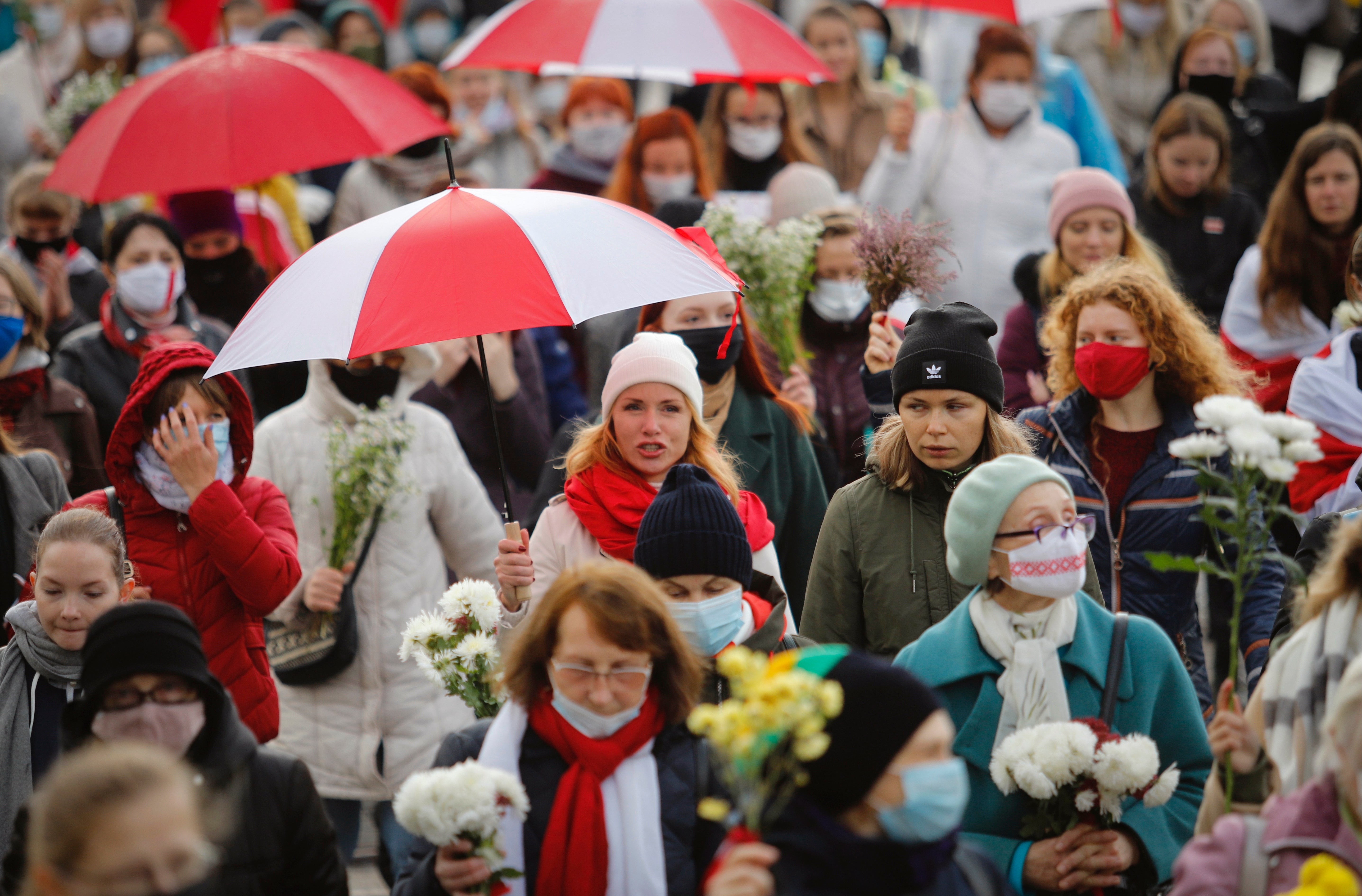Belarus: Protesters keep up push for president's resignation
Several hundred women have marched across the capital of Belarus in heavy rain to demand the resignation of the country’s authoritarian president, continuing more than 2 1/2 months of protests against his challenged reelection to a sixth term

Your support helps us to tell the story
From reproductive rights to climate change to Big Tech, The Independent is on the ground when the story is developing. Whether it's investigating the financials of Elon Musk's pro-Trump PAC or producing our latest documentary, 'The A Word', which shines a light on the American women fighting for reproductive rights, we know how important it is to parse out the facts from the messaging.
At such a critical moment in US history, we need reporters on the ground. Your donation allows us to keep sending journalists to speak to both sides of the story.
The Independent is trusted by Americans across the entire political spectrum. And unlike many other quality news outlets, we choose not to lock Americans out of our reporting and analysis with paywalls. We believe quality journalism should be available to everyone, paid for by those who can afford it.
Your support makes all the difference.Several hundred women marched across the capital of Belarus in heavy rain Saturday to demand the resignation of the country's authoritarian president, continuing more than 2 1/2 months of protests against his challenged reelection to a sixth term.
The demonstrations were triggered by official results giving President Alexander Lukashenko 80% of the vote in an Aug. 9 election that the opposition insists was rigged. Lukashenko, who has ruled Belarus with an iron fist since 1994, has accused the United States and its allies of fomenting unrest in the ex-Soviet country.
The women who marched Saturday in Minsk carried umbrellas in the white and red colors of the opposition flag. They also held placards stating their professions to underline widespread opposition to Lukashenko's 26-year rule among people of various occupations, chanting “Go away!” as a demand for the president's resignation.
Police arrested at least 10 march participants, according to the Viasna human rights center in Belarus. Smaller anti-government demonstrations were also held in several other cities.
Daily protests in Belarus have continued despite arrests and pressure, peaking on weekends with crowds of 100,000 and more. Another big protest is set for Sunday.
The United States and the European Union have dismissed the August election as neither free nor fair and introduced sanctions against top Belarusian officials accused of vote manipulation and a crackdown on peaceful protesters.
U.S. Secretary of State Mike Pompeo and EU foreign policy chief Josep Borrell discussed the situation in Belarus among other issues during a phone call on Friday.
The State Department said they agreed Belarusian authorities need to “engage in a meaningful dialogue with genuine representatives of civil society,” including Lukashenko's leading election opponent, opposition candidate Sviatlana Tsikhanouskaya. The EU and the United States also reiterated "their strong support for the independence and sovereignty of Belarus,” the State Department said.
The EU has warned it is ready to sanction Lukashenko himself if he fails to enter talks with the opposition. The Belarusian leader has ignored demands to negotiate and relied instead on political and economic support from Russia, his main ally and sponsor.
On Thursday, the EU awarded its top human rights prize to Tsikhanouskaya, 38, and the Belarus opposition movement. A former English teacher with no previous political experience, Tsikhanouskaya joined the presidential race after her husband was jailed in Belarus and prevented from running. He remains in prison.
Tsikhanouskaya, who moved to Lithuania after the election under pressure from Belarusian authorities, put forward an ultimatum to Lukashenko: announce his resignation by Oct. 25 or face a nationwide strike.